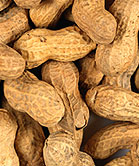- Could Your Grocery Store Meat Be Causing Recurring UTIs?
- Are You Making This Expensive Thermostat Error This Winter?
- Recognizing the Signs of Hypothyroidism
- 10 Strategies to Overcome Insomnia
- Could Artificial Sweeteners Be Aging the Brain Faster?
- Techniques for Soothing Your Nervous System
- Does the Water in Your House Smell Funny? Here’s Why
- Can a Daily Dose of Apple Cider Vinegar Actually Aid Weight Loss?
- 6 Health Beverages That Can Actually Spike Your Blood Sugar
- Treatment Options for Social Anxiety Disorder
Many Kids With Asthma Also Sensitive to Peanuts: Study


Sensitivity to peanuts is common among children with asthma, yet many children and their parents are unaware of the problem, a new study finds.
There’s been little research into the link between childhood asthma and peanut allergy, according to the study authors.
“Many of the respiratory symptoms of peanut allergy can mirror those of an asthma attack, and vice versa. Examples of those symptoms include shortness of breath, wheezing and coughing,” said the study lead author, Dr. Robert Cohn from Mercy Children’s Hospital in Toledo, Ohio, in a news release from the American Thoracic Society.
The study findings were scheduled to be presented Sunday at the American Thoracic Society meeting in Denver. Findings presented at meetings are generally viewed as preliminary until they’ve been published in a peer-reviewed journal.
Cohn and his colleagues analyzed the medical records of more than 1,500 children with asthma in Toledo, Ohio. The results showed that about 11 percent of the children had a documented history of peanut allergy.
The researchers found that nearly 44 percent had undergone a blood test to check for peanut allergy. Just over 20 percent of those children tested positive for peanut sensitivity.
However, more than half of these children and their families didn’t know the child had any sensitivity to peanuts.
“This study demonstrates children with asthma might benefit from a test for peanut sensitivity, especially when control of wheezing and coughing is difficult to achieve. If a physician is having this problem, or if a parent notices it in his or her asthmatic child, they should consider testing, even if they believe their child is not sensitive to peanuts,” Cohn said.
“There should be continued investigation to learn more about the connection between asthmatic children and peanut sensitivity,” he added.
More information
The American Lung Association has more about childhood asthma.
Source: HealthDay
Copyright © 2026 HealthDay. All rights reserved.










